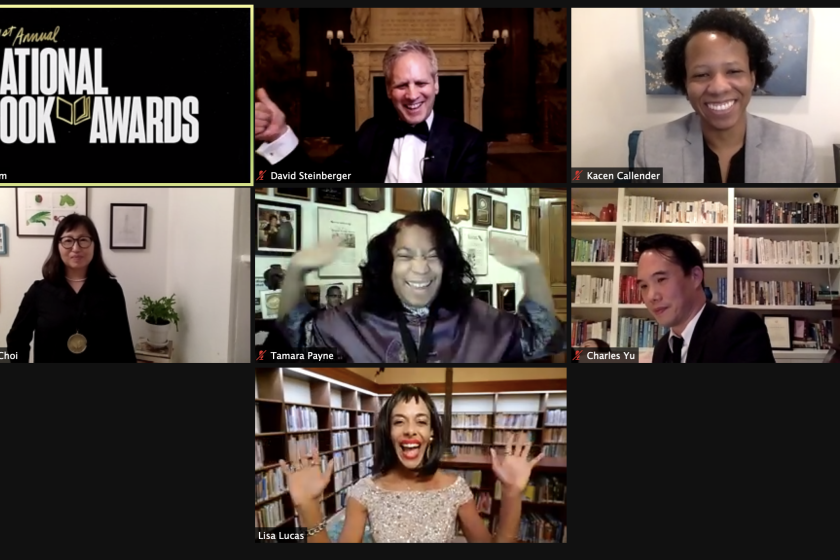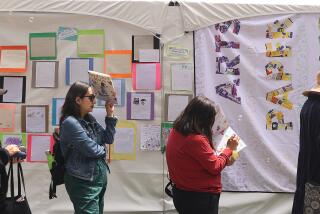The virtual 2020 National Book Awards were an emotional roller coaster with a hopeful kick
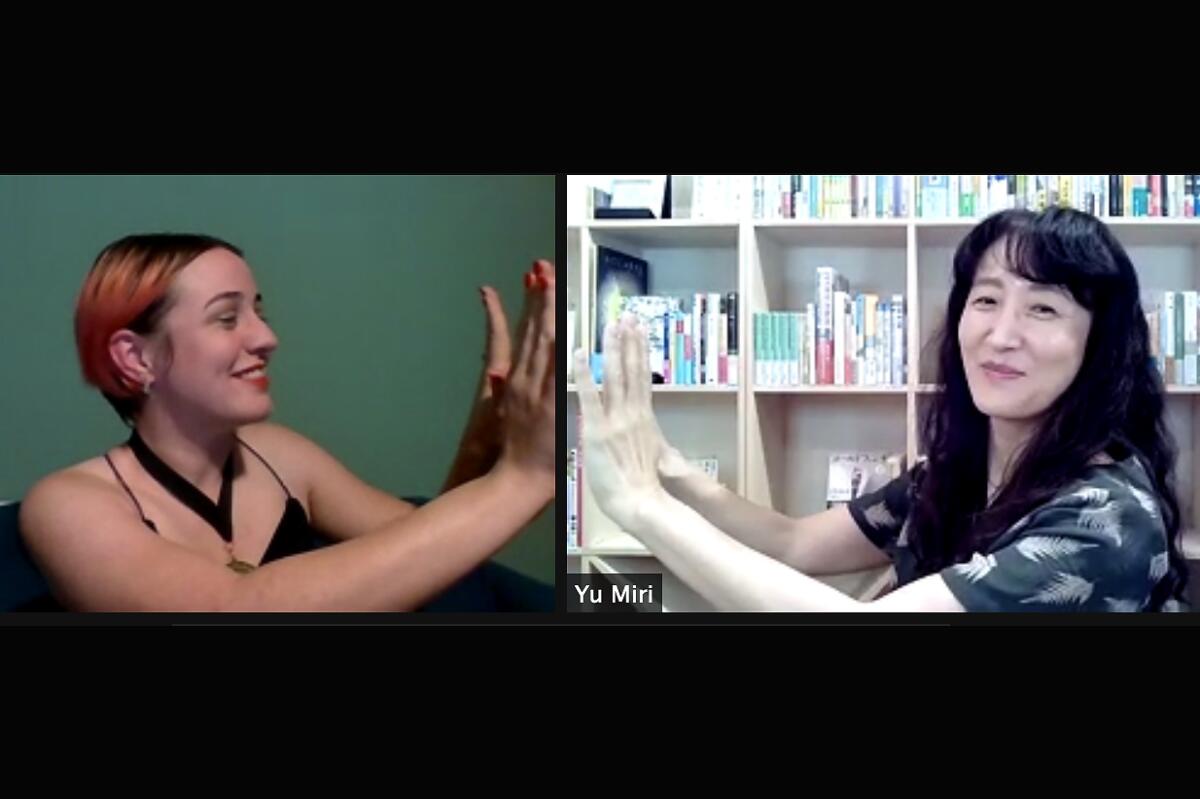
On the night of the 71st Annual National Book Awards, authors, writers, poets and book lovers put on their best suits, gowns, T-shirts and sweatpants and turned on their computers for an all-virtual event celebrating the best American literary talent.
For the first time in its history, the National Book Foundation — which typically grants prizes in a black-tie dinner ceremony held in a grand former bank in New York — livestreamed the awards on YouTube and the foundation’s website, following restrictions on gatherings amid a surging pandemic.
The 90-minute event was hosted by bestselling YA author Jason Reynolds and featured surprising voice cameos introducing the award categories: Wyatt Cenac, Natasha Lyonne, Rosie Perez, Marc Maron and Henry Golding.
The intimacy of close-up video speeches beamed mostly from living rooms and studies only amplified the emotional roller coaster of what felt like a cathartic moment in a historically grim year. There were laughs, leaps and plenty of tears — mostly but not always joyful.

Yu Miri and her translator Morgan Giles high-fived virtually in celebration of the translated literature prize for “Tokyo Ueno Station.” Tamara Payne broke down while accepting the nonfiction award for “The Dead Are Arising: The Life of Malcolm X,” partly on behalf of her late father. But it was foundation executive director Lisa Lucas, helming her last awards, who set the tone early.
“If we’ve learned one thing this year, it’s that books and book people are resilient,” said Lucas, who spoke live from the Los Angeles Central Library in a sequined ball gown and Crocs. “We’ve all lost so much. We’ve all lost so many luminaries. It’s been a tough year, but we’ve also seen, sadly, the very real limitations of the book business.” Then she discussed the ways publishing is addressing its inequities, partly through her own example.
“We haven’t been bold enough in our vision. We haven’t been brave enough in our choices. We haven’t been confident enough in our values to make sure that this industry, this community, is as strong and inclusive and vibrant as it could be — as it should be,” she said. “The ways that this year has tested us proves that we are capable of imagining new solutions to unprecedented problems, and it’s time to take that imagination and that fortitude and use it to address the problems that have always been with us. We can do better… and we must do better.”
For Lucas, the evening was an emotional farewell.
She announced in July that she was stepping down to become senior vice president and publisher of Knopf imprints Pantheon and Schocken Books. Her new role begins in January.
“Leaving is bittersweet,” said Lucas, breaking her earlier promise not to cry (she later thanked waterproof mascara). “It’s such a gift and comfort to see what we’ve built together.”
Lucas vividly recalled her first National Book Awards in 2016, just days after Donald Trump was elected president. She remembered the ultimately hopeful words of Rep. John Lewis that night as he received his young people’s literature award for “March: Book Three.”
“I think we all walked away [that night] with a little more hope, a little more faith that the work that we did mattered,” she said.
Also sounding an elegiac note was a posthumous honor for Carolyn Reidy, recipient of the Literarian Award for outstanding service to the American literary community. Reidy was Simon and Schuster’s president and chief executive from January 2008 until her death in May, at age 71, from a heart attack.
Accepting the honor on her behalf was Stephen Reidy, Carolyn’s spouse of 45 years.
The all-virtual 2020 National Book Awards ceremony awarded Charles Yu for fiction, Les and Tamara Payne for nonfiction, Don Mee Choi for poetry and others.
“For Carolyn, and for Carolyn and me, ever since we were those 19-year-old kids discussing a book, books and reading not only changed our lives, but more importantly, they gave us a life together,” he added. “And I believe that that life together, one built on books and reading, is the real recipient of this award today, because that shared life is testament to Carolyn’s conviction that reading is one of the greatest things that humans can do.”
The next honoree was Walter Mosley, receiving the Medal for Distinguished Contribution to American Letters, a lifetime achievement award whose past recipients include Toni Morrison, Isabel Allende, Joan Didion, Stephen King and Gwendolyn Brooks.
Presenting the honor was “Brother, I’m Dying” author Edwidge Danticat, who quoted Mosley’s own words in her introduction: “The job of the writer is to take a close and uncomfortable look at the world they inhabit, the world we all inhabit. And the job of the novel is to make the corpse stink.”
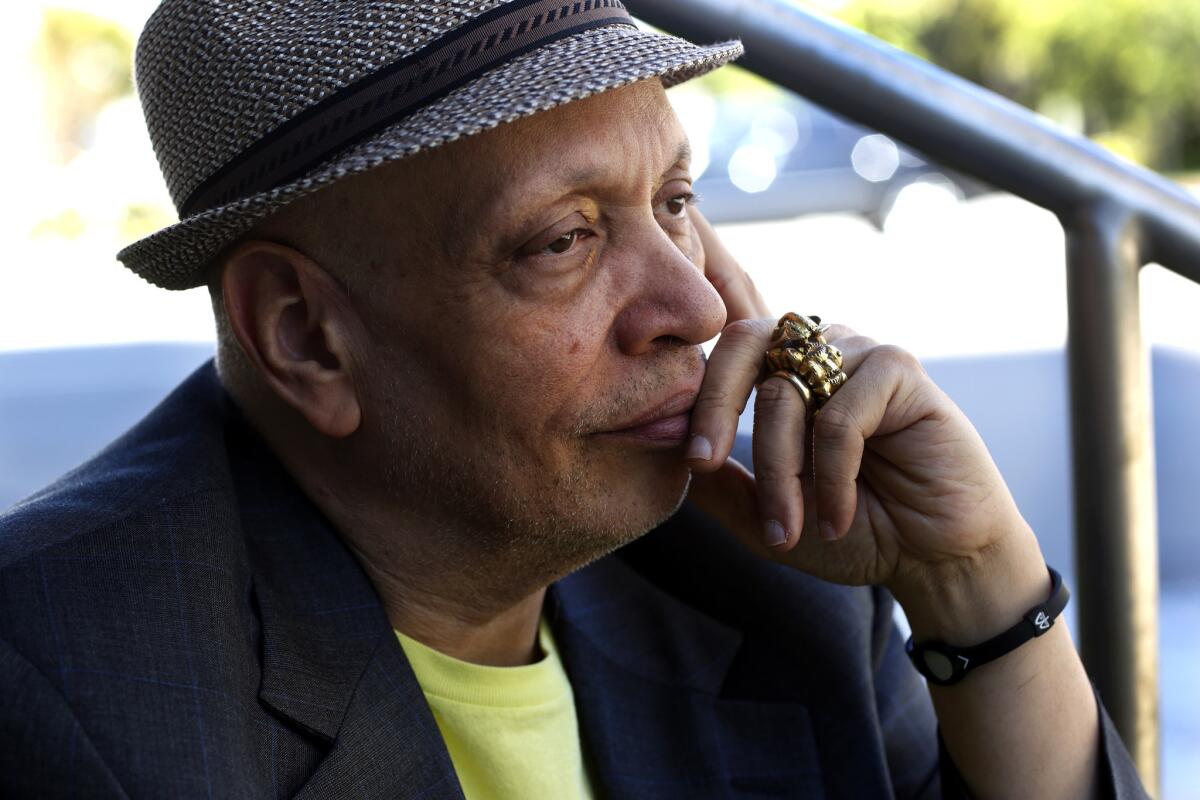
Mosley, donning a blue beetle pin on a dapper black blazer, spoke of the joys and possibilities of writing. He also acknowledged the weight that comes with being the first Black man to receive the recognition.
“We, the people who are darker than blue, have been here on this continent, in this storm for 400 years. As a matter of course we have been chained, beaten, raped, murdered, robbed of our names, our history and often even our dignity,” he said. “This has been an ongoing process. An unending anguish. And so one might be cowed by the monumental negative space surrounding that pinprick of light that this award represents. One might ask, could such a thing make a difference? Is this a dying gasp, or a first breath? Is today different from any other day over the past 400 years? I prefer to believe that we are on the threshold of a new day. That this evening is but one of 10,000 steps being taken to recognize the potential of this nation.”
Mosley’s speech was followed by a montage, narrated by actor LeVar Burton, of past Black winners, including Ta-Nehisi Coates and Jesmyn Ward, along with a reflective disclosure: Only 13 writers of color won a National Book Award between 1936 and 1999.
The night ended, of course, with award announcements — and more quickly than usual, without the usual pause between appetizers and entrees. Kacen Callender took home the young adult literature prize for “King and the Dragonflies,” and gave one of the night’s most tearful speeches. Don Mee Choi won the poetry prize for her collection “DMZ Colony,” about parallel narratives in South Korea and the U.S.; she thanked independent presses, translators and, most of all, her father.
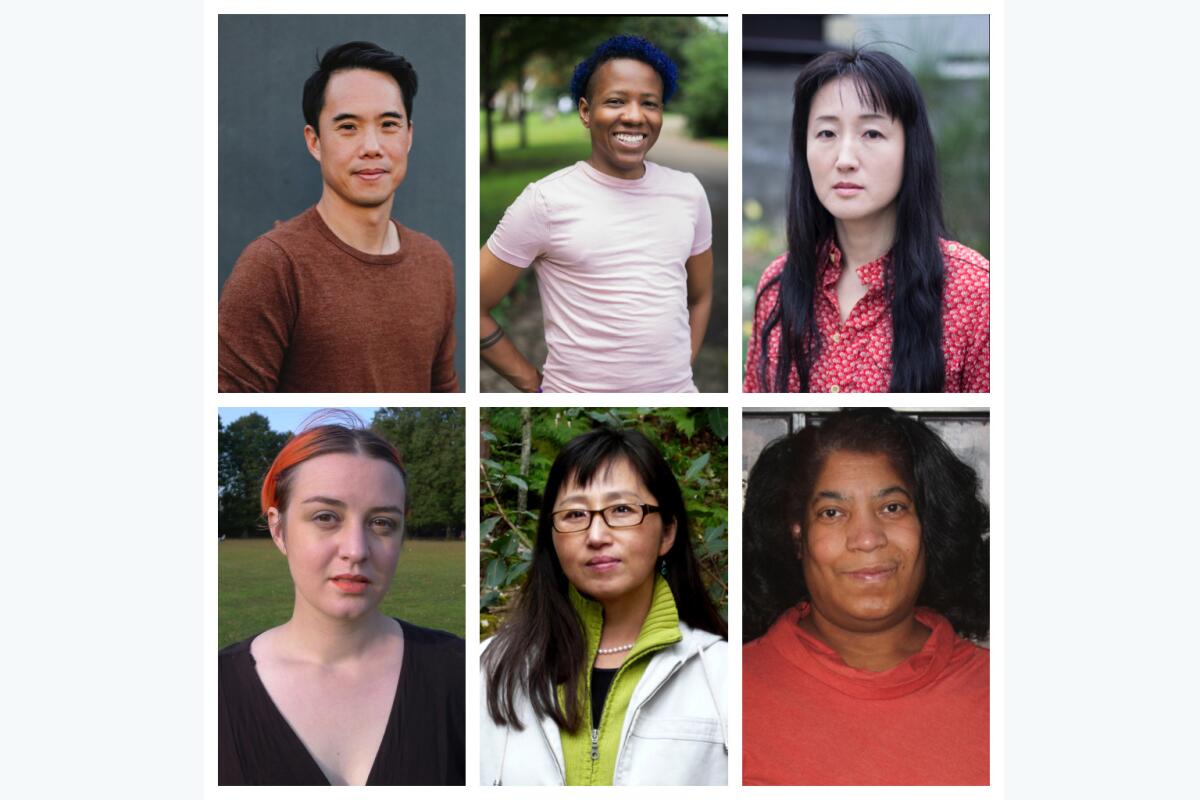
Winning for most joyous reactions were the recipients of the translated literature award, Yu Miri and her translator, Morgan Giles, for “Tokyo Ueno Station.”
“I am very surprised!” exclaimed a beaming Miri, who was cheered and high-fived by her friends in the room. One friend poked half her face into the frame and addressed Giles: “You did a great job!”
The nonfiction award went to “The Dead Are Arising,” which Les Payne had labored over for nearly 30 years before he died in 2018, after which his daughter, Tamara, finished the work. And Los Angeles native Charles Yu accepted the fiction prize for “Interior Chinatown,” his novel about an Asian American actor and, ultimately, the intersection of Hollywood archetypes and American stereotypes in the assimilation of people like him.
Yu’s victory was a small surprise. “I prepared nothing,” he said, looking a little shocked, “which tells you about how realistic I thought this was.” But then he gathered himself up and closed on the evening’s theme.
The author, most recently, of “Interior Chinatown” opts for “Independence Day,” a slew of inspiring novels, “Thor: Ragnarok” and “Ozark.”
“There’s not many reasons for hope right now,” said Yu. “But to be here, hearing about all of these books .... it is what keeps me going, and I hope that this community can sustain other people the same way.”
By the end of the evening, more than 1,050 people had donated $509,031 to the foundation, a few hundred thousand short of their $750,000 goal.
Closing out the ceremony, John Darnielle — frontman for the Mountain Goats, author, and one of five judges of the translated fiction prize — gave a surprise acoustic performance of the 2005 song “This Year,” with its prophetic, timely chorus: “I’m gonna make it through this year if it kills me.”
More to Read
Sign up for our Book Club newsletter
Get the latest news, events and more from the Los Angeles Times Book Club, and help us get L.A. reading and talking.
You may occasionally receive promotional content from the Los Angeles Times.
